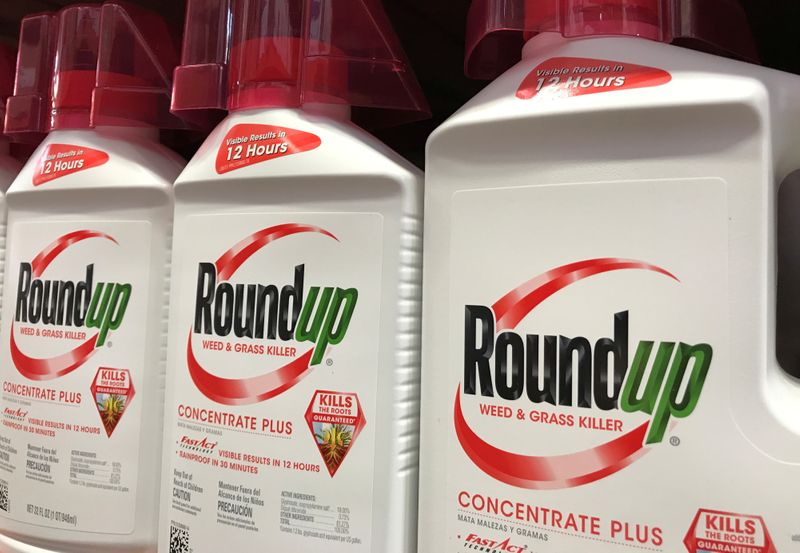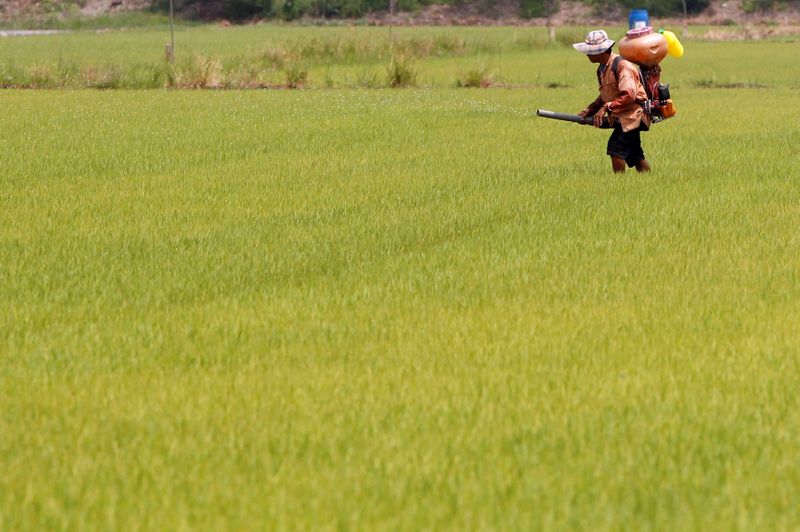BANGKOK (Reuters) – Chemicals giant Bayer and the U.S. government cooperated closely last year to lobby Thailand to reverse its ban on glyphosate, used in the company’s controversial weedkiller Roundup, documents obtained by an environmental group and reviewed by Reuters show.
The lobbying, including U.S. trade officials asking Bayer for information on Thailand’s deputy agriculture minister, is detailed in more than 200 pages of partially redacted documents and emails, some directly between U.S. officials and a Bayer representative.
The documents were obtained under the U.S. Freedom of Information Act by the Tucson, Arizona-based Center for Biological Diversity, which shared them with Reuters.
Thailand eventually dropped plans to ban glyphosate a few days before the ban was due to come into force in December 2019. It had approved the restriction in October citing concerns over the chemical’s impact on human health.
Reuters was unable to determine the reasons for the reversal or whether efforts by the United States and Bayer played a role in Thailand’s decision.
A government spokeswoman denied any foreign influence on the reversal of the ban.
While regulators worldwide, including the U.S. Environmental Protection Agency (EPA), have determined glyphosate to be safe, Bayer agreed in June to settle nearly 100,000 U.S. lawsuits for $10.9 billion, denying claims that Roundup caused cancer.
Thailand had initiated significant steps in August 2019 to ban glyphosate and other chemicals widely deemed toxic to humans. The World Health Organization’s cancer research arm classified glyphosate as “probably carcinogenic to humans” in March 2015.
As Thailand considered the ban on glyphosate, Bayer kicked off its lobbying effort. The Germany-headquartered firm, which acquired U.S. Roundup maker Monsanto for $63 billion in 2018, made an appeal for help arguing against the ban to the United States Department of Agriculture (USDA) on Sept. 18 last year, the documents reviewed by Reuters show.
CONSISTENT WITH LAWS, RULES -BAYER
In a statement to Reuters, Bayer said, “Our engagements with all those in the public sector are routine, professional, and consistent with all laws and regulations.”
“The Thai authorities’ reversal of the ban on glyphosate is consistent with the science-based determinations by regulatory bodies around the world.”
Ratchada Dhanadirek, a spokeswoman for Thailand’s government, said the country supported safe agriculture and prioritised farmers’ and consumers’ health, noting that glyphosate was widely used internationally and there was no viable alternative.
The Prime Minister’s Office denied knowledge of the U.S. or Bayer’s lobbying efforts when asked to comment on the documents reviewed by Reuters.
The Office of the U.S. Trade Representative (USTR) did not respond to Reuters requests for comment on the documents and its role in the reversal of the ban.
‘FOCUS ON THE PM’
The documents show that deputy agriculture minister Mananya Thaiset was identified in particular by Bayer as “seeking to dramatically accelerate the imposition of a ban” on glyphosate and other farm chemicals.
In July, before the documents were shared with Reuters, Mananya said she was motivated to ban glyphosate and other chemicals after attending many farmers’ funerals in her previous job as a mayor.
USTR officials discussed Mananya in an internal email chain dated Oct. 22, the day that Thailand approved plans to ban glyphosate, the documents show. In a separate email to Bayer, an unidentified USTR official sought more information on her from the chemicals company.
“Knowing what motivates her may help with USG (U.S. government) counter-arguments” to reverse the ban, the official wrote. “She has no record of being diehard advocate of organic food and/or staunch environmentalist,” Bayer’s Senior Director for International Government Affairs and Trade, Jim Travis, replied.
Mananya couldn’t be reached for comment on whether she had been approached by Bayer or U.S. officials and her office declined Reuters’ requests for comment on the documents.
While Bayer and the USTR sought to understand the mindset of Mananya, whom one USTR official described as “well-connected”, the documents make clear their main objective was access to the prime minister.
In an emailed response to the USTR on Oct. 24, Bayer’s Travis said, “All efforts should be focused on the PM,” referring to Thailand’s Prime Minister, Prayuth Chan-ocha.
Prayuth could not be reached for comment on the documents. He has rarely expressed his views publicly on the chemical ban. After the glyphosate ban was reversed, he only said, he had “no problem” with the decision.
GROWING MARKET
On Oct. 17, Ted McKinney, the USDA Under Secretary for Trade and Foreign Agricultural Affairs, wrote to Prayuth, asking for a postponement of the ban. Prayuth repeatedly declined to comment on McKinney’s letter when asked by reporters.
“The U.S. EPA … has found that there are no risks to human health when glyphosate is used in accordance with its current label,” a USDA spokesperson said in response to Reuters’ request for comment on the documents.
A ban on glyphosate would have meant grain grown using it could not enter Thailand, denying U.S. exporters of bulk crops – including soybeans and wheat – access to a market that, like others in Southeast Asia, has grown massively from 2015 to nearly $1 billion in value in 2019, U.S. data shows.
(Graphic: U.S. crop sales to Thailand since 2010, https://fingfx.thomsonreuters.com/gfx/ce/jbyvrqzggpe/USCropSalestoThailand.png)
(Graphic: Southeast Asia has emerged as a key growth market for U.S. crop exporters, https://fingfx.thomsonreuters.com/gfx/ce/xklvynwnxpg/USBulkCropDestinations.png)
Despite the initial lobbying efforts, Thailand’s National Hazardous Substances Committee formally approved the ban on Oct. 22 with an effective start date in December.
U.S. officials continued their efforts as late as Nov. 26, the documents show.
On Nov. 27, Thailand reversed course. A government committee announced the country was abandoning the ban four days before it was due to take effect, citing concerns over foreign trade impact, alongside the impact on farmers and food and animal feed industries.
(Reporting by Patpicha Tanakasempipat; Editing by Matthew Tostevin and Kenneth Maxwell)


























